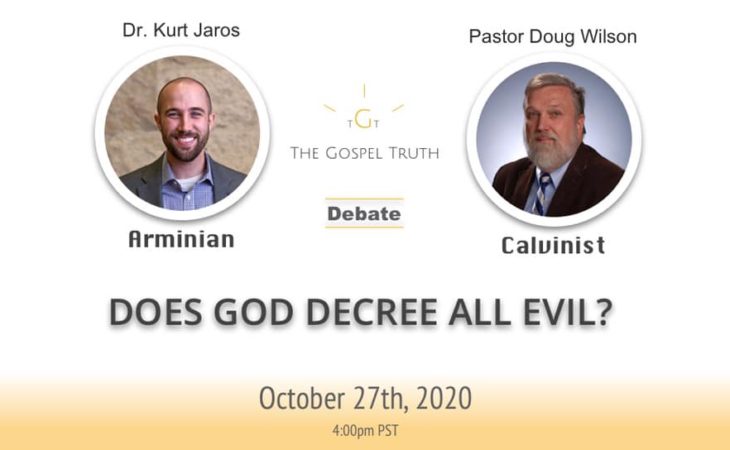
Last week I debated Pastor Doug Wilson on the subject, “Does God Decree All Evil?” The word “all” proved to be critical at the early stages, because Pastor Wilson was a bit surprised when, in my opening speech, I agreed that God orchestrated/ordained/decreed some evil actions in the course of human history. This was perhaps unexpected because it is typical for Arminians to respond to Calvinists by saying that God does not cause any evil. How could he? He’s the God of love, mercy, justice, etc. For this debate, however, I knew that I did not have to defend that position. Rather, I just had to prove that God has not decreed all evil actions.
What’s the big difference between “all” and “some”? It could be a substantial difference! When we speak and even think, we do so in quantifying terms: “No mustard for me,” “May I have some of your fries?,” or “All of those sound good to me.” So when we ask whether God decrees evil actions, there is a substantial difference between the type of divine Creator who decrees all evil actions and the type of divine Creator who decrees a limited amount of evil actions to produce his necessary goal(s).
What I could have done is I could have disputed that the actions described in the Bible actually qualify as evil actions. This could have led us down a rabbit hole about subjective vs. objective evil, and that may be a hole worth exploring with someone at a later date (i.e., from God’s perspective are there truly evil actions or are alleged evil actions only evil from our subjective perspective? What makes an action evil and unjustifiable?). But, I didn’t want to go that route. Instead, I thought to grant the position that God allows some evils, but that those evils are contextually limited to God’s purposes in the history of salvation (historia salutis).
Indeed, the Biblical texts in support of these scenarios have a limited scope: “You meant evil against me, but God meant it for good, to bring it about that many people should be kept alive, as they are today” (Genesis 50:20). This is about Joseph being sold into slavery and the scope of the act covers the specific purpose that God had planned. It does not provide any warrant to leap to the position that God has decreed all evil actions. This is also the case for other verses, two of which I mentioned in my opening speech (Acts 2:23 and Isaiah 10:20-23). In my rebuttal I also addressed 1 Sam 2:12-25 about God’s desire to have Eli’s son’s put to death because of their wicked actions. This is a verse that was cited and without a context could be misconstrued: “for it was the will of the Lord to put them to death.” But what does that even mean? The decretive will of the Lord? Desirous will? A will that cares not for the circumstances? It’s clear that God wanted Eli’s son’s to die because they were degrading God’s holiness by sleeping with women who served at the tabernacle(!).
I also provided biblical texts which depict a somewhat indeterminate framework. Jeremiah 19:5 indicates that God “did not command or decree” the child sacrificing to Baal, Acts 10:38 suggests suffering is of the devil (and therefore not God), Deuteronomy 30:9b-15 points to a genuine option for Israel, and other verses. Ezekiel 18:23, “Have I any pleasure in the death of the wicked, declares the Lord God, and not rather that he should turn from his way and live?” If God decrees all evil, why would he not simply decree that the wicked man “turn from his way and live,” as God explicitly mentions is his desire? Perhaps you can imagine the concerns over the character and justice of God, given the two different positions. I raised some of these concerns and concern over Wilson’s use of the term “free” as my second main point in my opening speech.
There’s more to say, but if you haven’t had the chance to watch the debate, here it is below. If you’d like to listen to my opening speech, you can go to the timestamp at 25:53 of the video.
The debate could have gone in a number of directions, and in cross examination the discussion went more into a philosophical defense of Wilson’s interpretation. His arguments (defending his biblical interpretation) chiefly took the form of analogies and anecdotes. Looking back, if I were in a similar situation, I would try and steer the conversation back to hermeneutics, because a number of my points went unaddressed. Wilson did bring up some interesting points in cross examination, but you’ll have to stay tuned if you want to get more thoughts on that issue.
I’d loved to hear from you, friend or foe! To get in touch, you can comment below. Want to support my academic research and teaching efforts in theological discussions about the nature of man and the scope of sin? Click here!
- Tags
- arminianism
- calvinism

Comments